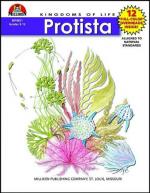|
This section contains 3,264 words (approx. 11 pages at 300 words per page) |

|
The kingdom Protista is the most diverse of all the five Eukaryotic kingdoms. There are more than 200,000 known species of protists with many more yet to be discovered. Protists can be found in countless colors, sizes, and shapes. They inhabit just about any area where water is found some or all of the time. They form the base of ecosystems by making food, as is the case with photosynthetic protists, or by themselves being eaten by larger organisms. They range in size from microscopic, unicellular organisms to huge seaweeds that can grow up to 300 ft (100 m) long.
The German zoologist Ernst Haeckel (1834-1919) first proposed the kingdom Protista in 1866. This early classification included any microorganism that was not a plant or an animal. Biologists did not readily accept this kingdom, and even after the American botanist Herbert F. Copeland again tried to establish its use 90 years later, there...
|
This section contains 3,264 words (approx. 11 pages at 300 words per page) |

|


